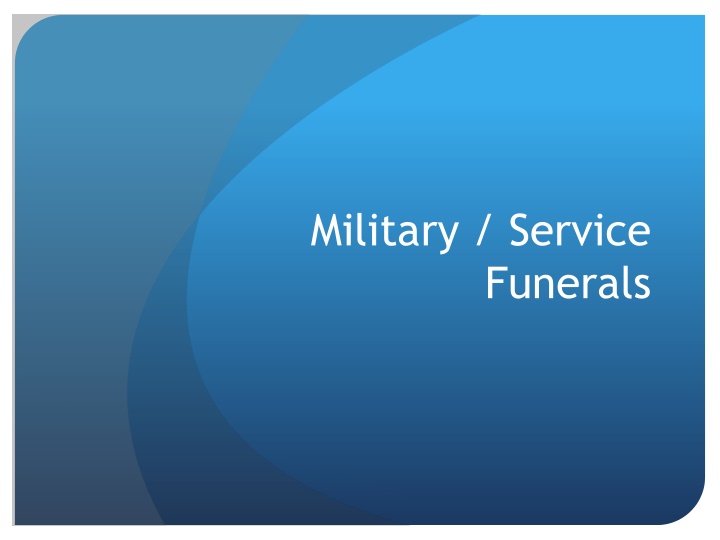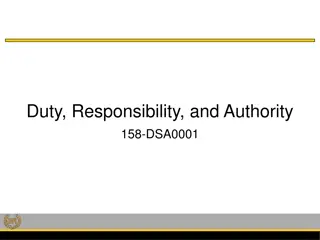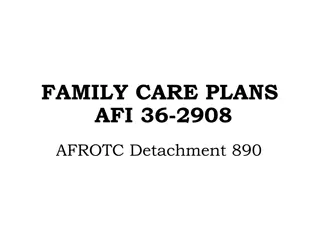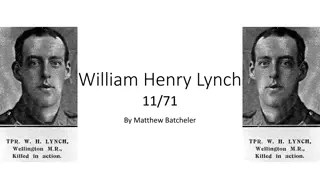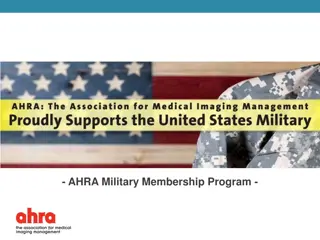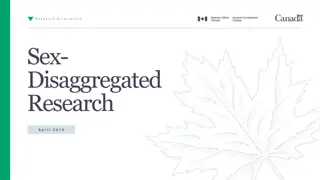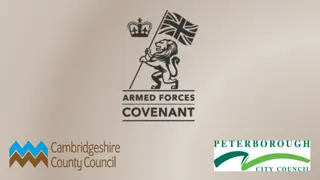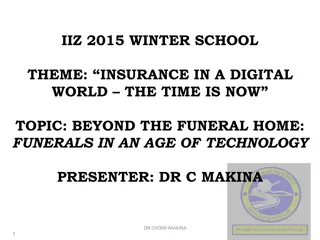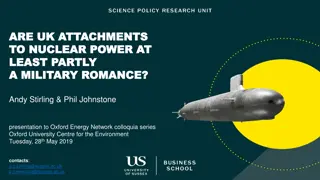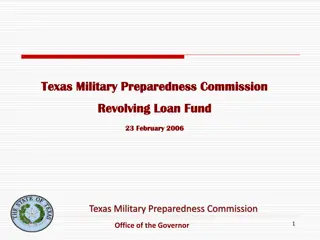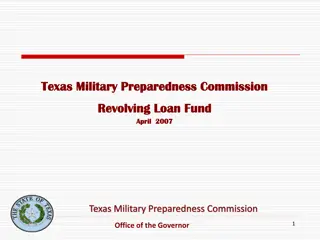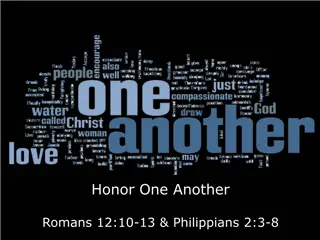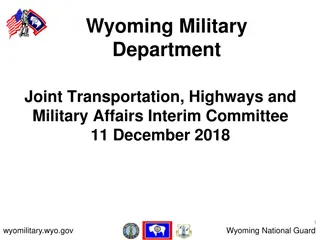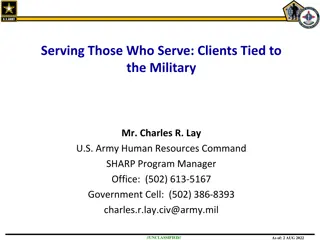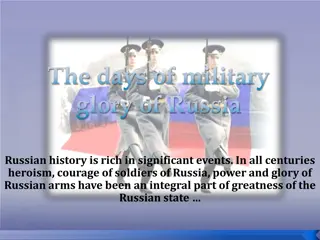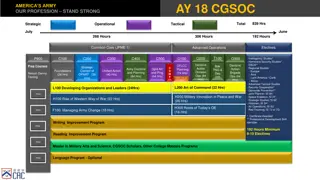Military Service Funerals: Honoring Those Who Served
Service funerals for military personnel are arranged and funded by the armed forces, reflecting the wishes of the family. Whether following operational or non-operational deaths, the Ministry of Defence provides support and grants to assist with funeral expenses. Families can choose between a service-funded or private funeral, with key decisions communicated through a military Visiting Officer. The solemn ceremonies may involve military bearer parties and firing parties, offering tribute and respect to those who served their country.
Download Presentation

Please find below an Image/Link to download the presentation.
The content on the website is provided AS IS for your information and personal use only. It may not be sold, licensed, or shared on other websites without obtaining consent from the author.If you encounter any issues during the download, it is possible that the publisher has removed the file from their server.
You are allowed to download the files provided on this website for personal or commercial use, subject to the condition that they are used lawfully. All files are the property of their respective owners.
The content on the website is provided AS IS for your information and personal use only. It may not be sold, licensed, or shared on other websites without obtaining consent from the author.
E N D
Presentation Transcript
Military / Service Funerals
Ministry of Defence. (MoD) Joint Casualty and Compassionate Centre (JCCC)
The definition of a service funeral is a funeral arranged and paid for by the armed forces. It will normally be arranged by the deceased s unit and reflect the wishes of the family. It does not have to be overtly militaristic in nature, but will often involve a military bearer party and firing party.
Broadly speaking the Funeral Director can expect to encounter service (military) funerals arising in three categories: those following operational deaths (deaths in theatre) non-operational deaths overseas those following deaths in the UK, such as following road accidents or long illness
Anyone who dies in military service is entitled to either a service funded (military) or private funeral. The choice is a matter for the next of kin or executor.
With a service funded (military) funeral, the unit will pay the majority of the funeral directors bill, whilst the family are responsible for settling the bill following a private funeral.
In both cases the NOK, or executor, will receive a 1,000 funeral expenses grant from the JCCC to help meet any non-admissible funeral expenses and to help with costs to attend any memorial/remembrance service or unit homecoming parade. For those families who choose to organise a private funeral, the MOD will also pay a second grant (of up to 3,385) on production of a receipted funeral bill.
In any of these cases the earliest possible indication should be given to and obtained from the military Visiting Officer (VO) appointed to support the family of whether the family intend a private or military funded funeral.
The options may be explained to the family by the VO prior to contact with the funeral director or the funeral director may be the conduit for this.
Operational Deaths Following a death overseas, the bodies of service personnel are now routinely repatriated to the UK. For operational deaths this is into the care of the Oxfordshire coroner, with repatriation ceremonies both on departure and arrival.
Repatriation is carried out under a contract issued by the JCCC according to the following procedure: 1. The VO advises the family on the likely repatriation timetable, based on information obtained from the JCCC. This briefing will usually take place within 72 hours of the death, with the MoD aiming to repatriate bodies from operational theatres within 10 days 2. A representative of the JCCC s contracted funeral director is deployed to theatre to help coffin and prepare the body. Early advice on the feasibility of viewing by the family upon return to the UK can be obtained via the VO/JCCC.
3. The deceased is flown to the UK in a zinc-lined coffin. Repatriations are into RAF Brize Norton Repatriationceremoniesareamilitaryevent,buttheVOcana rrangeforupto7relatives to attend the event with accommodation and travel costs being met by the MoD On the morning of the repatriation a briefing is provided for the family at a hotel near Brize Norton to explain the days events.
The briefings are provided by 1.The Repatriation Centre Manager at RAF Brize Norton 2.The Coroner s officer 3.A representative from the JCCC 4.A representative of the service concerned
4. the aircraft by a military bearer party and placed in a hearse provided by the contracted funeral director, from where it is driven to the RAF Brize Norton repatriation centre and placed in the chapel of rest. This allows the family to spend some private time with their loved one. Thereafter the body is moved in a cortege under police escort to the hospital in Oxford and into the care of the coroner.
5. Once the coroner has finished his work the JCCCs contracted funeral director will collect the body and take it to their premises, re-coffin the body and convey him or her to the family s chosen funeral director. The MoD Contractor will liaise with the family funeral director over the handover arrangements. It is aimed that from arrival in the UK to arrival at the destination funeral director no more than 72 hours should normally elapse but this is subject to the Coroners requirements. As such, the family funeral director is advised not to set a firm date for the funeral until they have confirmation of the date the body will be released by the Coroner
6. For deaths occurring on operations overseas, the JCCC will register the death under the terms of the Registration of Births, Deaths and Marriages (Special Provisions) Act 1957
The contracted funeral director to the Ministry of Defence is F.A. Albin & Sons
Where a serviceman or woman dies overseas whilst on holiday or for other personal reasons outside the country in which they are serving, repatriation arrangements will not be made by the MoD and must be arranged by the family themselves utilising any travel insurance policy the deceased may have held.
Deaths occurring overseas arising from or linked to military service will be registered by the JCCC or other relevant military authority.
Deaths that occur on holiday or whilst the individual is travelling overseas for personal reasons should be registered by the NEXT OF KIN with the British Embassy or High Commission in the country concerned.
The MoD does not register deaths that occur in the UK. All deaths should be registered with the local registrar by the next of kin themselves.
The funeral director should be aware that their principle contact in such circumstances will be the VO It is possible that the Lord Lieutenant and Mayor will attend. The Royal British Legion may also be represented. It should be expected that local police will provide an escort for the cortege and provide any necessary crowd control.
If the service is to be religious it may be led by a forces chaplain, with the local vicar assistance as required or requested. In cooperation with the VO the funeral director should ensure that a full rehearsal takes place the day before the funeral.
This should involve the full forces bearer party with its commanding officer using a weighted coffin to practice full bearing and, in the case of a burial, lowering of the coffin. The bearer party itself, usually of six, will be commanded by a Regimental Sergeant Major (RSM) or other senior non commissioned officer (SNCO). Whoever it is carries the title OC (Officer Commanding) Bearer Party.
If the deceased was a member of British forces the Union Flag must be used.
The deceaseds unit may provide the deceaseds cap, medals (if any), belt and a poppy wreath. These should be placed on the coffin in that order from the head downwards. In addition to these items a marine might have a dagger. An officer may have a sword.
Service personnel who die in present day conflicts are not entitled to be buried in Commonwealth War Graves Commission (CWGC) cemeteries commemorating those killed in the two world wars, but may be able to be interred in CWGC maintained plots in town / council cemeteries, depending on the deeds of dedication.
However, advice must be sought from the VO / CWGC (01628 507200) before offering an interment in such a plot to the family. No Exclusive Right of Burial (ERB) is issued for graves within a military cemetery. They may also be prepared at extra depth to allow for subsequent burials.
The Ministry of Defence will pay for: the funeral director s professional charges, including care of the deceased a hearse and one limousine church/cemetery/cremation fees a standard coffin Any additional costs necessitated to comply with the individuals faith or religious requirements.
The MoD will also not pay for discretionary disbursements such as: flowers orders of service newspaper notices
Reference https://www.gov.uk/guidance/joint-casualty-and- compassionate-centre-jccc#funerals-and-graves
